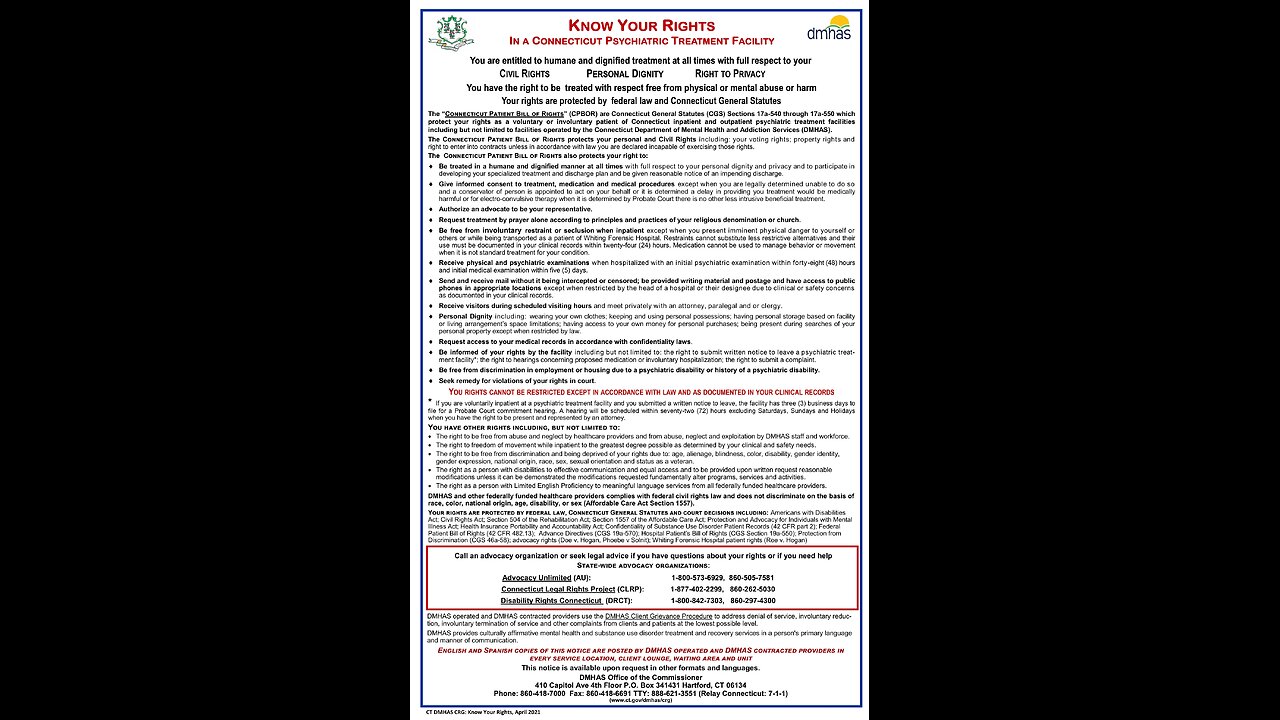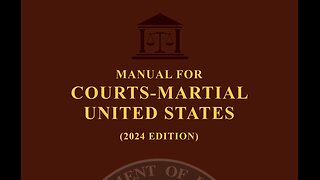Premium Only Content

WANTED: Connecticut Judge Alex V. Hernandez for Kidnapping & Contempt of Court
Charges: Judge Alex V. Hernandez Stamford Superior Court 11/3/2025
Criminal / Motor Vehicle Pending Cases Name Summary
Information is accurate as of November 04, 2025, 05:13 AM
Search By: Defendant = MAGLIARI
Record Count: 4
Defendant (Last, First) Birth Year Court Next Activity/Status Next Activity/Status Date Hearing Type Docket No.
MAGLIARI SAMUEL 1963 Stamford GA 1 Awaiting Disposition 01/06/2026 09:00 AM S01S-CR24-0254894-S
MAGLIARI SAMUEL 1963 Stamford GA 1 Awaiting Disposition 01/06/2026 09:00 AM S01S-CR24-0254895-S
MAGLIARI SAMUEL 1963 Stamford GA 1 Awaiting Disposition 01/06/2026 09:00 AM S01S-CR24-0254896-S
MAGLIARI SAMUEL 1963 Stamford GA 1 Awaiting Disposition 01/06/2026 09:00 AM S01S-CR24-0254897-S
Common Legal Terms | Contact Us | Site Map | Website Policies
Copyright © 2025, State of Connecticut Judicial Branch
Connecticut General Statutes (CGS) - KIDNAPPING
Sec. 53a-91. Definitions.
Sec. 53a-92. Kidnapping in the first degree: Class A felony.
Sec. 53a-92a. Kidnapping in the first degree with a firearm: Class A felony.
Sec. 53a-93. Proceeding to determine sentence for kidnapping in first degree.
Sec. 53a-94. Kidnapping in the second degree: Class B felony: Three years not suspendable.
Sec. 53a-94a. Kidnapping in the second degree with a firearm: Class B felony: Three years not suspendable.
Sec. 53a-95. Unlawful restraint in the first degree: Class D felony.
In United States v. Alhindi, 97 F.4th 814 (11th Cir. 2024), the U.S. Court of Appeals for the Eleventh Circuit ruled that the statute governing mental competency to stand trial does not limit the timing or frequency of competency proceedings. The district court was within its authority to order more than one competency examination. Additionally, the government’s request for an additional examination did not violate the statutory four-month limit on involuntary hospitalizations.
18 USC 4241: Determination of mental competency to stand trial to undergo post release proceedings Text contains those laws in effect on November 3, 2025
From Title 18-CRIMES AND CRIMINAL PROCEDUREPART III-PRISONS AND PRISONERSCHAPTER 313-OFFENDERS WITH MENTAL DISEASE OR DEFECT
§4241. Determination of mental competency to stand trial to undergo postrelease proceedings 1
(a) Motion To Determine Competency of Defendant.-At any time after the commencement of a prosecution for an offense and prior to the sentencing of the defendant, or at any time after the commencement of probation or supervised release and prior to the completion of the sentence, the defendant or the attorney for the Government may file a motion for a hearing to determine the mental competency of the defendant. The court shall grant the motion, or shall order such a hearing on its own motion, if there is reasonable cause to believe that the defendant may presently be suffering from a mental disease or defect rendering him mentally incompetent to the extent that he is unable to understand the nature and consequences of the proceedings against him or to assist properly in his defense.
(b) Psychiatric or Psychological Examination and Report.-Prior to the date of the hearing, the court may order that a psychiatric or psychological examination of the defendant be conducted, and that a psychiatric or psychological report be filed with the court, pursuant to the provisions of section 4247(b) and (c).
(c) Hearing.-The hearing shall be conducted pursuant to the provisions of section 4247(d).
(d) Determination and Disposition.-If, after the hearing, the court finds by a preponderance of the evidence that the defendant is presently suffering from a mental disease or defect rendering him mentally incompetent to the extent that he is unable to understand the nature and consequences of the proceedings against him or to assist properly in his defense, the court shall commit the defendant to the custody of the Attorney General. The Attorney General shall hospitalize the defendant for treatment in a suitable facility-
(1) for such a reasonable period of time, not to exceed four months, as is necessary to determine whether there is a substantial probability that in the foreseeable future he will attain the capacity to permit the proceedings to go forward; and
(2) for an additional reasonable period of time until-
(A) his mental condition is so improved that trial may proceed, if the court finds that there is a substantial probability that within such additional period of time he will attain the capacity to permit the proceedings to go forward; or
(B) the pending charges against him are disposed of according to law;
whichever is earlier.
If, at the end of the time period specified, it is determined that the defendant's mental condition has not so improved as to permit the proceedings to go forward, the defendant is subject to the provisions of sections 4246 and 4248.
(e) Discharge.-When the director of the facility in which a defendant is hospitalized pursuant to subsection (d) determines that the defendant has recovered to such an extent that he is able to understand the nature and consequences of the proceedings against him and to assist properly in his defense, he shall promptly file a certificate to that effect with the clerk of the court that ordered the commitment. The clerk shall send a copy of the certificate to the defendant's counsel and to the attorney for the Government. The court shall hold a hearing, conducted pursuant to the provisions of section 4247(d), to determine the competency of the defendant. If, after the hearing, the court finds by a preponderance of the evidence that the defendant has recovered to such an extent that he is able to understand the nature and consequences of the proceedings against him and to assist properly in his defense, the court shall order his immediate discharge from the facility in which he is hospitalized and shall set the date for trial or other proceedings. Upon discharge, the defendant is subject to the provisions of chapters 207 and 227.
(f) Admissibility of Finding of Competency.-A finding by the court that the defendant is mentally competent to stand trial shall not prejudice the defendant in raising the issue of his insanity as a defense to the offense charged, and shall not be admissible as evidence in a trial for the offense charged.
(June 25, 1948, ch. 645, 62 Stat. 855 ; Pub. L. 98–473, title II, §403(a), Oct. 12, 1984, 98 Stat. 2057 ; Pub. L. 109–248, title III, §302(2), July 27, 2006, 120 Stat. 619 .)
Sec. 52-467. Punishment for refusal to obey writ or accept copy. If any person having the custody of the body of anyone directed to be presented to the court or to a judge by a writ of habeas corpus duly served fails to present the body according to the command in the writ, or refuses to accept the copy of the writ offered in service, or in any way fraudulently avoids presenting the body according to the command, or, having presented the body, does not make return of the cause of detaining the person in custody, he shall be guilty of a contempt of court and may be punished for contempt by the court or judge by commitment, and shall pay to the person so held in custody two hundred dollars.
(1949 Rev., S. 8203; P.A. 82-160, S. 170.)
History: P.A. 82-160 rephrased the section.
Sec. 54-82m. Rules re speedy trial to be adopted by judges of Superior Court effective July 1, 1985. In accordance with the provisions of section 51-14, the judges of the Superior Court shall make such rules as they deem necessary to provide a procedure to assure a speedy trial for any person charged with a criminal offense on or after July 1, 1985. Such rules shall provide that (1) in any case in which a plea of not guilty is entered, the trial of a defendant charged in an information or indictment with the commission of a criminal offense shall commence within twelve months from the filing date of the information or indictment or from the date of the arrest, whichever is later, except that when such defendant is incarcerated in a correctional institution of this state pending such trial and is not subject to the provisions of section 54-82c, the trial of such defendant shall commence within eight months from the filing date of the information or indictment or from the date of arrest, whichever is later; and (2) if a defendant is not brought to trial within the time limit set forth in subdivision (1) of this section and a trial is not commenced within thirty days of a motion for a speedy trial made by the defendant at any time after such time limit has passed, the information or indictment shall be dismissed. Such rules shall include provisions to identify periods of delay caused by the action of the defendant, or the defendant's inability to stand trial, to be excluded in computing the time limits set forth in subdivision (1) of this section.
(P.A. 82-349, S. 2, 4; P.A. 83-1, S. 2, 3; P.A. 07-217, S. 194.)
History: P.A. 82-349, S. 2, effective July 1, 1985; P.A. 83-1 made provisions applicable to person charged with criminal offense on or after July 1, 1985, effective March 24, 1983; P.A. 07-217 made technical changes, effective July 12, 2007.
Cited. 202 C. 443; 218 C. 85; 233 C. 813. Exception to 60-day limitation period for acts of God and misconduct on part of defendant is a necessary implication. 242 C. 389. Cited. 243 C. 115. Trial court properly determined that the time that co-defendant's attorney was unavailable was excludable time for computing the commencement of defendant's trial. 252 C. 714. Administrative incompetence, whether founded in negligence, recklessness or a serious dereliction of duty, does not constitute “exceptional circumstances”, and therefore “good cause”, for the failure to bring defendant to trial before the 30-day period has expired. 265 C. 437.
Cited. 14 CA 244; 33 CA 184; judgment reversed, see 232 C. 707; 37 CA 384; 38 CA 868. Statutory right to speedy trial cited. 40 CA 483. Cited. Id., 643; Id., 757; 42 CA 144; 43 CA 488. Right to protection of statute waived by withdrawing motion and not filing for dismissal. 47 CA 91. Cited. 54 CA 361. Section codifies defendant's constitutional right to speedy trial and confers on Superior Court judges authority to make such rules as they deem necessary to establish procedure for implementing that right. 66 CA 357. Defendant not deprived of right to speedy trial when trial delay was occasioned by continuances requested by defendant's counsel, rather than by defendant, and defendant did not object. 78 CA 659.
The “Connecticut Patient Bill of Rights” (CPBOR) are Connecticut General Statutes (CGS) Sections 17a-540 through 17a-550 which protect your rights as a voluntary or involuntary patient of Connecticut inpatient and outpatient psychiatric treatment facilities including but not limited to facilities operated by the Connecticut Department of Mental Health and Addiction Services (DMHAS).
The Connecticut Patient Bill of Rights protects your personal and Civil Rights including: your voting rights; property rights and right to enter into contracts unless in accordance with law you are declared incapable of exercising those rights.
The Connecticut Patient Bill of Rights also protects your right to:
• Be treated in a humane and dignified manner at all times with full respect to your personal dignity and privacy and to participate in developing your specialized treatment and discharge plan and be given reasonable notice of an impending discharge.
• Give informed consent to treatment, medication and medical procedures except when you are legally determined unable to do so and a conservator of person is appointed to act on your behalf or it is determined a delay in providing you treatment would be medically harmful or for electro-convulsive therapy when it is determined by Probate Court there is no other less intrusive beneficial treatment.
• Authorize an advocate to be your representative.
• Request treatment by prayer alone according to principles and practices of your religious denomination or church.
• Be free from involuntary restraint or seclusion when inpatient except when you present imminent physical danger to yourself or others or while being transported as a patient of Whiting Forensic Hospital. Restraints cannot substitute less restrictive alternatives and their use must be documented in your clinical records within twenty-four (24) hours. Medication cannot be used to manage behavior or movement when it is not standard treatment for your condition.
• Receive physical and psychiatric examinations when hospitalized with an initial psychiatric examination within forty-eight (48) hours and initial medical examination within five (5) days.
• Send and receive mail without it being intercepted or censored; be provided writing material and postage and have access to public phones in appropriate locations except when restricted by the head of a hospital or their designee due to clinical or safety concerns as documented in your clinical records.
• Receive visitors during scheduled visiting hours and meet privately with an attorney, paralegal and or clergy.
• Personal Dignity including: wearing your own clothes; keeping and using personal possessions; having personal storage based on facility or living arrangement’s space limitations; having access to your own money for personal purchases; being present during searches of your personal property except when restricted by law.
• Request access to your medical records in accordance with confidentiality laws.
• Be informed of your rights by the facility including but not limited to: the right to submit written notice to leave a psychiatric treat ment facility*; the right to hearings concerning proposed medication or involuntary hospitalization; the right to submit a complaint.
• Be free from discrimination in employment or housing due to a psychiatric disability or history of a psychiatric disability.
• Seek remedy for violations of your rights in court. YOU RIGHTS CANNOT BE RESTRICTED EXCEPT IN ACCORDANCE WITH LAW AND AS DOCUMENTED IN YOUR CLINICAL RECORDS * If you are voluntarily inpatient at a psychiatric treatment facility and you submitted a written notice to leave, the facility has three (3) business days to file for a Probate Court commitment hearing. A hearing will be scheduled within seventy-two (72) hours excluding Saturdays, Sundays and Holidays when you have the right to be present and represented by an attorney.
You have other rights including, but not limited to:
• The right to be free from abuse and neglect by healthcare providers and from abuse, neglect and exploitation by DMHAS staff and workforce.
• The right to freedom of movement while inpatient to the greatest degree possible as determined by your clinical and safety needs.
• The right to be free from discrimination and being deprived of your rights due to: age, alienage, blindness, color, disability, gender identity, gender expression, national origin, race, sex, sexual orientation and status as a veteran.
• The right as a person with disabilities to effective communication and equal access and to be provided upon written request reasonable modifications unless it can be demonstrated the modifications requested fundamentally alter programs, services and activities.
• The right as a person with Limited English Proficiency to meaningful language services from all federally funded healthcare providers. DMHAS and other federally funded healthcare providers complies with federal civil rights law and does not discriminate on the basis of race, color, national origin, age, disability, or sex (Affordable Care Act Section 1557). Your rights are protected by federal law, Connecticut General Statutes and court decisions including: Americans with Disabilities Act; Civil Rights Act; Section 504 of the Rehabilitation Act; Section 1557 of the Affordable Care Act; Protection and Advocacy for Individuals with Mental Illness Act; Health Insurance Portability and Accountability Act; Confidentiality of Substance Use Disorder Patient Records (42 CFR part 2); Federal Patient Bill of Rights (42 CFR 482.13); Advance Directives (CGS 19a-570); Hospital Patient’s Bill of Rights (CGS Section 19a-550); Protection from Discrimination (CGS 46a-58); advocacy rights (Doe v. Hogan, Phoebe v Solnit); Whiting Forensic Hospital patient rights (Roe v. Hogan)
LEGAL MAXIM:
The government is to be subject to the law, for the law makes the government.
AUTHORITY:
As a living-breathing American Man, one of “We the People”, the Owners of Our Government, I, Andrew Hamilton Pritchard, Sui Juris, have the authority to address any felony that I witness firsthand (CGS 54-170 Arrest without Warrant).
-
 13:11
13:11
Humble on Rumble
18 days agoSubject: President – Executive Branch Loss of Power and Authority, Nullity.
65 -
 4:29:59
4:29:59
SynthTrax & DJ Cheezus Livestreams
1 day agoFriday Night Synthwave 80s 90s Electronica and more DJ MIX Livestream CHROMIUM Edition
18.3K4 -
 LIVE
LIVE
GritsGG
14 hours agoBO7 Warzone Is Here! Win Streaking! New Leaderboard?
362 watching -
 3:53:07
3:53:07
VapinGamers
6 hours ago $1.63 earnedDestiny 2 - Star Wars Renegade Lightsabers Oh My! - !rumbot !music
16.8K1 -
 2:13:17
2:13:17
TheSaltyCracker
7 hours agoPipe Bomb Bull Sh*t ReeEEStream 12-05-25
96.6K218 -
 4:31:26
4:31:26
DannyStreams
5 hours agoBF the WZ
7.42K -
 LIVE
LIVE
Finfante
5 hours ago $0.24 earned*Interactive Stream* Something is WRONG. (Dane Jonson). | LIVE INDIE HORROR NIGHT
61 watching -
 21:51
21:51
DBoss_Firearms
12 hours ago $0.36 earnedHeaded to The Gathering with some friends!
6.34K -
 58:48
58:48
Flyover Conservatives
1 day agoUnmasking Antifa: Inside the Red–Green Revolution Aimed at the U.S. Constitution - Kyle Shideler | FOC Show
19.1K26 -
 55:26
55:26
Sarah Westall
6 hours agoJobs Losses Hit the Millions, Real Estate Nightmare, Repo Markets, & more w/ Andy Schectman
23.9K11